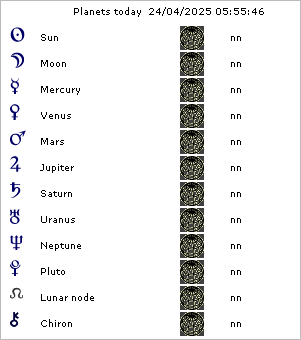The meaning of the Natal chart
Edited by Daniela Grazioli
What is a natal chart? I will begin by telling a story: the Platonic myth of Er that is in the last book of the Republic. The idea is this: souls before being born are in a kind of limbo, they all have a destiny to complete which however that in certain sense corresponds to the particular "character" of each soul, therefore they must choose a "life", a "man" fit to complete an assigned part of his destiny. Before going down to Earth a companion is given them, a "genius" or "daimon", in order that it will guard him in order to ensure that during its life-time the soul carries out its own destiny. By coming into the world, however, the soul forgets everything and believes it is born naked, empty and alone, his daimon still clearly remembers the content of his "character", of his innate image, and thus becomes the bearer and depositary of his destiny. In the Platonic myth, this destiny, whose memory is kept by the daimon, this image or shape of a plan that needs to be completed, represents his place in the world, his own contribution to life in the universe, the part assigned to each one in the order of the world.
This is what Plato said in the past.
Nowadays, J. Hillman, a thinker and Jung based analyst, proposes the "theory of the acorn", to us, whose interior contains a vocation, the motivation to become a unique and wonderful oak tree that it will try to be. The theory of Hillman’s acorn refers to the perception, to the feeling, often evaded, omitted or unheard, which is therefore the reason why we are "here". The feeling is therefore the reason they are in this world, in their unique and unrepeatable form, the sensation of being a responsible person towards "something" with a confused outline, but that necessarily calls us and pushes us towards a certain directions not others.
The theory of the acorn asserts that each person has his/her one uniqueness, a "personality" for needs the "time” to live, a vocation to be that unique, unrepeatable individual, to be high and leafy, or a low and massive oak tree that the acorn and its own daimon have chosen, in a time before time began.
In this way a great modern thinker leads us by the hand to rediscover and to recover the indemonstrable, but undoubtedly heartfelt "truths" tried by each man.
The natal chart is in a certain sense the photograph of the acorn, of the model, of the image of the oak tree that we can become; it is the map, the drawing of our potential.
In philosophical terms it is the refusal to think of our life as a story written by inherited genii and environmental influences, which from the beginning decide upon a script for us that we will be forced to recite without any possibility of getting round it.
What good does it do to know our own natal chart?
It is used by us to re-appropriate ourselves, for redeeming a destiny of cause - effect that sees us as powerless pieces in a game played by genii and the environment, victims or heroes-only-against "freedom" that has allowed us to enter this game where we have not been place because of the uniqueness of being "ourselves", for the feeling of not being here by chance, for the feeling that there are things that let us feel alive and full of meaning and sometimes empty and senseless. Our natal chart gives us the casket of our unconditioned uniqueness, whose realization is the true and real freedom to which we can aspire.
Print this article
|
 |



